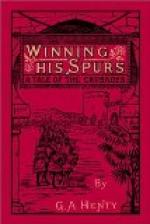Journeying onward, Blondel and his companion stopped at many castles, and were everywhere hospitably entertained. Arriving at Vienna they lingered for some time, hoping there to be able to obtain some information of the whereabouts of King Richard. Blondel in his songs artfully introduced allusions to the captive monarch and to the mourning of all Christendom at the imprisonment of its champion. These allusions were always well received, and he found that the great bulk of the nobles of the empire were indignant and ashamed at the conduct of the emperor in imprisoning his illustrious rival. The secret of his prison place, however, appeared to have been so well kept that no information whatever was obtainable.
“We must carry out our original plan,” he said at length, “and journey into the Tyrol. In one of the fortresses there he is most likely to be confined.”
Leaving the capital they wandered up into the mountains for weeks, visiting one castle after another. It was no easy matter in all cases to get so near to these prisons as to give a hope that their voice might be heard within, or an answer received without. More than once cross-bow bolts were shot at them from the walls when they did not obey the sentinel’s challenge and move further away. Generally, however, it was in the day time that they sang. Wandering carelessly up, they would sit down within earshot of the castle, open their wallets, and take out provisions from their store, and then, having eaten and drunk, Blondel would produce his lute and sing, as if for his own pleasure. It needed, however, four visits to each castle before they could be sure that the captive was not there; for the song had to be sung on each side. Sometimes they would cheat themselves with the thought that they heard an answering voice; but it was not until the end of the fourth week, when singing outside the castle of Diernstein, that a full rich voice, when Blondel ceased, sang out the second stanza of the poem. With difficulty Blondel and Cuthbert restrained themselves from an extravagant exhibition of joy. They knew, however, that men on the prison wall were watching them as they sat singing, and Blondel, with a final strain taken from a ballad of a knight who, having discovered the hiding place of his ladylove, prepared to free her from her oppressors, shouldered his lute, and they started on their homeward journey.
There was no delay now. At times they sang indeed at castles; but only when their store was exhausted, for upon these occasions Blondel would be presented with a handsome goblet or other solid token of the owner’s approval, and the sale of this at the next city would take them far on their way. They thought it better not to pass through France, as Philip, they knew, was on the watch to prevent any news of King Richard reaching England. They therefore again passed through Brabant, and so by ship to England.




